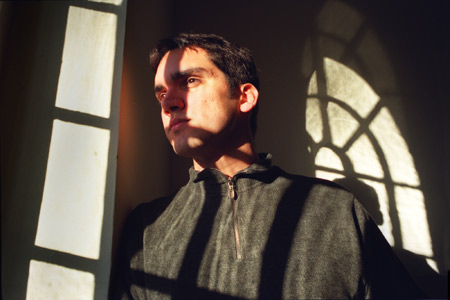Undergrad’s evolution isn’t random
Sophomore studies mutation rates of budding yeast
 Like many first-year students, David Solá-Del Valle ’04 came to Harvard with a number of goals. High on Solá-Del Valle’s “to do” list, however, was an item other freshmen might find a little daunting: landing a spot in a biology research lab.
Like many first-year students, David Solá-Del Valle ’04 came to Harvard with a number of goals. High on Solá-Del Valle’s “to do” list, however, was an item other freshmen might find a little daunting: landing a spot in a biology research lab.
Solá-Del Valle was committed, though. He had worked at a university lab in his native Puerto Rico since he was in 10th grade, and had also spent a summer at Cornell researching in a microbiology lab. “When I came to Harvard,” he says, “I had an enormous desire to continue doing research.”
Toward the end of his first semester, Solá-Del Valle looked into the research interests of about 30 faculty members at Harvard, met with a number of professors, and visited several labs. When the dust cleared, he had joined the lab of Andrew Murray, professor of molecular and cellular biology. Murray is interested in the general principles that underlie the function and evolution of cells. He and his team of researchers are studying the transmission of genetic information during cell division and how cells evolve in response to selective pressure.
With a stipend from the Harvard College Research Program, Solá-Del Valle has been studying mutation rates of cells under stressful conditions. According to Charles Darwin’s theory of natural selection, evolution is the result of the nonrandom survival of randomly occurring gene mutations. However, as Solá-Del Valle explains, scientists have questioned whether the rate of mutagenesis (the development of mutations) is truly random. In fact, studies have shown that a number of factors will increase mutation rates.
Solá-Del Valle is exploring the effect that one of those factors – stress – has on the mutation rates of budding yeast.
“The cells of the budding yeast will be subjected to different stressful conditions, including amino acid starvation, growth in a nonoptimal carbon source, and high temperature,” says Solá-Del Valle.
By using various positive and negative controls and measuring the growth rate of the yeast cells, he hopes to determine whether mutation rates vary as a result of environmental stress and in response to growth rate.
The project is a big one, and Solá-Del Valle has been working hard to lay the groundwork since February, 2001. During that time, he has become a “regular” in the lab, working about 15 hours per week during the school year and full time this past summer. “The Murray lab has given me a warm welcome, and has made me feel a part of a family of researchers,” says Solá-Del Valle. “I have become a member of their team as they discuss their projects, scientific problems, and results with me. They share creative solutions I’ve been able to apply to my experiments. And they continuously encourage me to think critically and to read and analyze scientific papers, extracting the key points I need to improve my experimental methods.” One highlight of Solá-Del Valle’s experience was his final presentation to all members of the lab at the end of the summer.
Solá-Del Valle’s project is progressing nicely, and he is back in the lab this fall. He greatly values the relationship he has developed with Murray and recently asked him to be his academic adviser. Murray accepted, and the two have had a number of discussions about research opportunities and careers in science.
Solá-Del Valle also has high praise for Dawn Thompson, a postdoctoral fellow in Murray’s lab with whom he has worked closely during the past 10 months. “She has been a fantastic mentor because she has guided me through this project with patience and dedication,” says Solá-Del Valle. “The best part is that she has not given me answers directly. I have been the one in charge of finding the answers with her suggestions and guidance.
“Problem-solving skills are crucial to the success of a biologist,” he continues. “During the trouble-shooting process, my mentors encouraged me to e-mail cutting-edge scientists in the field to clarify formulas and methods or ask for help when we weren’t able to find a solution for problems that had arisen. Thus, not only did I have a close relationship with my mentors, but I also had the opportunity of networking with other professional biologists.”
Solá-Del Valle plans a career in science research; he’s currently considering graduate study in genetics, neurobiology, or a related field. His experience in the Murray lab is helping him fine-tune those plans while reminding him of what drew him to research in the first place. “Biology’s task is to find answers to crucial questions about life,” he says, “and research gives me the opportunity to help answer those questions, and to see biology come alive. I also love the environment, the teamwork, and the process of sharing results, analyzing data, discarding lousy interpretations, or just celebrating when people find good answers to important questions.”




